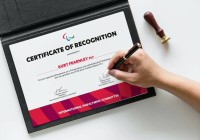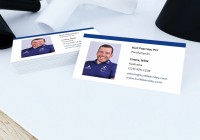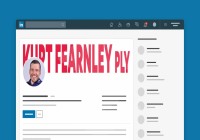IPC introduces PLY post-nominal titles to recognise Paralympians
NewsPLY can be added alongside the Paralympians’ name on official documentation, social media, cv, business cards or anywhere else their name may be used Pioneering Paralympians Kevin Coombs and Ragnhild Myklebust, the first athletes to receive PLY status.
The International Paralympic Committee (IPC) has announced its PLY post-nominal initiative to recognise the Paralympians’ contribution to the Movement through their hard work, commitment to and promotion of the Paralympic values.
Post-nominal letters, such as PhD or MD, are placed after a person's name to indicate that they hold a position, honour, or is a member of a fraternity. As such, PLY can be added alongside the Paralympians’ name on official documentation, social media, cv, business cards, presentations, email signature or anywhere else their name may be used.
The idea for PLY was put forward as a motion by Paralympics Australia at the 2019 IPC General Assembly and approved by an overwhelming majority of IPC members. The motion cited that the introduction of post-nominative letters for athletes who have competed at a Paralympic Games would be "symbolic recognition of their achievement and status in society."
The first two athletes to officially receive the PLY initials are two pioneering Paralympians, Ragnhild Myklebust and Kevin Coombs OAM.
- Kevin Coombs OAM was one of first 219 Paralympians. Now 80-years-old, he was a member of the first Australian Paralympic Team that took part in the Rome 1960 Paralympic Games. Australia’s first ever Indigenous Paralympian (or Olympian), Kevin competed in wheelchair basketball and athletics across five Paralympic Games from 1960 to 1984.
- Ragnhild Myklebust holds the record for the most medals won at the Paralympic Winter Games. The 78-year-old Norwegian competed in biathlon, cross-country and ice-sledge speed racing at five Paralympics from 1998-2002. She won 27 medals, 22 of them gold.
Paralympians are invited to apply to use the post-nominal letters by completing an online registration form. Following approval from the IPC of the PLY status, Paralympians will be able to use their post-nominative letters and download a certificate of recognition.
IPC President Andrew Parsons said: “As an athlete-centred organisation, at the IPC we believe it is important to recognise all Para athletes who have devoted years to training and have made huge sacrifices to reach the Paralympic Games, which is the pinnacle sporting event.
“To be a Paralympian is to be part of an elite club and only around 28,000 people can claim to be a Paralympian. That is why I am thrilled that Kevin Coombs and Ranghild Myklebust are the first recipients. They are an important part of our history, and we must always remember those who set us on this path towards greater inclusion for persons with disabilities.”
Kevin Coombs added: “To be the first athlete to receive PLY status is very special to me and my family. I already have three letters after my name with my Order of Australia medal, but this goes down with that as something to be immensely proud of.”
Ragnhild Myklebust commented: “I feel very honoured to receive this. One of the wonderful things for athletes about having these three letters on our signatures is that people are going to ask, what does PLY stand for? For me it is the feeling that I am equal, and I can do what other people do.”
IPC Athletes’ Council Chairperson Jitske Visser added: “Participating at the Paralympic Games is every Para athlete’s goal. Many devote their whole lives to their sport, putting in years of work and training.
“Excelling at the highest level in their respective sport and becoming a Paralympian is a unique achievement. Using the PLY post-nominal letters is a great way to get recognition for this accomplishment. This initiative also has the potential to connect and bring Paralympians from different generations together.”
Paralympics Australia President Jock O’Callaghan said: “Paralympics Australia is proud to see that the important motion we proposed to the IPC General Assembly to adopt post-nominals for Paralympians has come to fruition. We are grateful that the IPC membership endorsed our view that the achievements of Paralympians are worthy of such an honour, and we applaud the moves made by the IPC to implement the process.”
A Para athlete will be eligible to apply if:
- In relation to a Paralympic Games, the athlete completed the formal process by which their accreditation was validated in the host country and was included on the sport entry list, pursuant to which they were deemed eligible to compete in that Paralympic Games.
- The athlete was not subsequently determined to be ineligible to compete in that Paralympic Games due to being reclassified at that Paralympic Games as Not Eligible or designated CNC (as defined in the IPC Classification Code, as amended from time to time).
- The athlete has confirmed that they accept the terms of the PLY Code of Conduct; and
- The athlete is not currently serving a period of Ineligibility for an anti-doping rule violation.
A Paralympian will be eligible to use a PLY designation once their application has been accepted, provided that they are not currently serving a period of ineligibility for an anti-doping rule violation.
Click here to register for PLY




